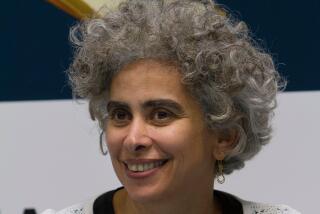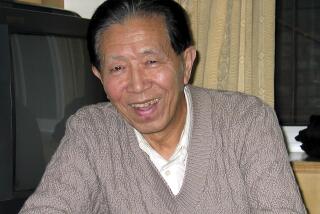Big names on letter calling for China to end censorship
- Share via
Reporting from Beijing — A former secretary to Mao Tse-tung as well as an ex-publisher of the People’s Daily are among retired Communist Party heavyweights who have published a toughly worded open letter calling on the Chinese government to abolish censorship.
The letter began circulating Oct. 1, but the campaign has gained traction since Friday, when the Nobel Peace Prize was awarded to dissident writer Liu Xiaobo, imprisoned for his role in drafting a similar pro-democracy letter called Charter 08 two years ago.
This latest call for freedom will not be so easily suppressed because of the Communist Party bona fides of the people who signed.
“These are important people who signed the letter with their names, titles and locations, requesting freedom of expression,” Li Datong, a former editor at the China Youth Daily who is friends with the organizers, said this week. “Clearly, they are not afraid. The trend cannot be stopped.”
Sort of a cross between a chain letter and a petition, this latest missive has been popping up — and then disappearing as it is removed by censors — on various Chinese bulletin boards and blogs over the last few days.
It calls for the uncensored circulation of books, newspapers and magazines and the lifting of restrictions on the Internet. It demands the dismantling of the Central Propaganda Department, the powerful body that reports directly to the Politburo and which the letter’s drafters refer to as an “invisible black hand.”
“When our country was founded in 1949, our people cried out that they had been liberated, that they were now their own masters,” the letter states. “But even today, 61 years after the founding of our nation, after 30 years of opening and reform, we have not yet attained the freedom of speech and press to the degree enjoyed by the people of Hong Kong under colonial rule.”
The letter notes that Chinese state news media have not even reported on a recent series of remarks made by Premier Wen Jiabao calling for political reforms. (“Without the protection afforded by political reforms, the gains we have made from economic reforms will be lost,” Wen said in a speech in August in Shenzhen, across from Hong Kong. The remarks subsequently were repeated in various interviews during a trip last month to attend the United Nations General Assembly.)
“Not only the average citizen, but even the most senior leaders of the Communist Party have no freedom of speech,” the letter complains.
The original 23 signatories include Li Rui, now 93, a former secretary to Mao who was later imprisoned for criticizing his excesses, as well as former top officials of the People’s Daily and the China Daily and other heavyweight retirees, such as the former curator of the Forbidden City and a onetime deputy political director of the military command in the southern metropolis of Guangzhou.
More than 400 others have since added their signatures, according to Li Datong, who said, “The numbers would have been in the thousands except that these people are old and not very good at sending the letter over the Internet.”
The Chinese government, meanwhile, continued to lash out in fury over the awarding of the Nobel Peace Prize to literature professor and essayist Liu, calling it a plot to weaken China.
“If Mr. Nobel has a soul in heaven, this is definitely not what he wants to see,” the Global Times, a newspaper with close ties to the Communist Party, said in an editorial Wednesday.
Liu’s wife, fellow activist Liu Xia, has said that, if she is allowed to leave China, she will accept the Nobel prize Dec. 10 in Oslo on behalf of her husband. At the moment, Liu Xia is under house arrest at the couple’s home in Beijing.
“I can’t get out of the door of my own apartment, let alone the door of the country,” Liu said in an interview published Wednesday in the Times of London.
European diplomats who attempted to visit Liu Xia on Tuesday were not permitted through the gates of her apartment compound. Half a dozen Chinese activists, including some of the couple’s friends, have been arrested, confined to their homes or harassed since Friday.
Although Chinese authorities have shown no signs of releasing the 54-year-old Liu Xiaobo from his 11-year prison sentence, his wife reported that his food has improved and that authorities are now serving him individually prepared hot meals.
barbara.demick@latimes.com
More to Read
Sign up for Essential California
The most important California stories and recommendations in your inbox every morning.
You may occasionally receive promotional content from the Los Angeles Times.













